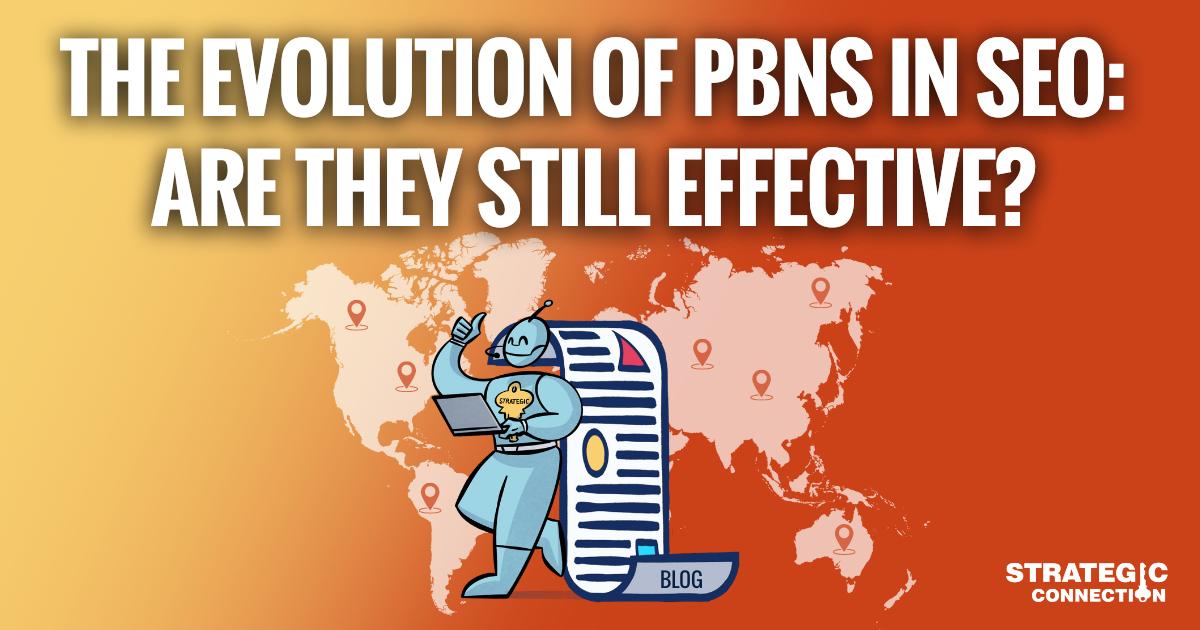
The Evolution of PBNs in SEO: Are They Still Effective?
Posted by: Kyle Fiorelli
May 15, 2024
The Evolution of PBNs in SEO: Are They Still Effective?
Strategies come and go in the ever-evolving landscape of search engine optimization (SEO). One approach that has garnered praise and criticism is using Private Blog Networks (PBNs). PBNs in SEO have been a hot topic for years, touted as a shortcut to higher search engine rankings. However, their effectiveness and ethical implications have been subject to debate. In this article, we'll dig deeper into what PBNs are, the types of PBNs, why SEO companies use them, their effectiveness, and Google's stance on PBNs.

What are PBNs?
Private Blog Networks (PBNs) are networks of websites owned by the same individual or entity. These websites are typically created to manipulate search engine rankings by linking to a primary website. The links within the network are perceived by search engines as signals of authority and relevance, influencing the ranking of the linked website. PBNs are a collection of interconnected websites that serve as a means of manipulating search engine algorithms.
Types of PBNs
- 1. Self-hosted PBNs: These PBNs involve setting up websites on different servers with unique IP addresses. SEO practitioners have complete control over these websites' content, design, and linking structure. Self-hosted PBNs offer the highest level of customization and control but require significant technical expertise and resources to set up and maintain.
- 2. Web 2.0 PBNs: Web 2.0 platforms such as WordPress.com, Blogger, or Tumblr are used to host content in this type of PBN. These platforms offer simplicity and ease of use, making them accessible to a wider audience. However, they are less effective in terms of SEO than self-hosted PBNs and are more susceptible to detection by search engines due to their shared hosting environment. (Difference between PBN vs Web 2.0 Backlinks (backlinkboss.com)
- 3. Expired Domain PBNs: Expired domain PBNs involve purchasing expired domains that still retain some authority and backlink profile. SEO practitioners repurpose these domains for their PBN, leveraging their existing authority to boost the rankings of their target websites. While this approach can provide a head start regarding domain authority, it requires careful consideration of domain history and relevance to avoid penalties from search engines.
Why SEO Companies Use PBNs
SEO companies often resort to using PBNs for several reasons:
- 1. Quick Rankings: PBNs offer a shortcut to higher search engine rankings, bypassing the time-consuming process of earning organic backlinks. By strategically placing links within the network, SEO practitioners can artificially inflate the rankings of their target website in a relatively short amount of time.
- 2. Control: PBNs give SEO practitioners full control over the content and links within the network. This level of control allows them to manipulate search engine algorithms to their advantage, ensuring that their target website receives maximum visibility in search results.
- 3. Cost-effectiveness: Compared to other SEO strategies, such as content marketing or link building outreach, setting up and maintaining a PBN can be relatively inexpensive. Utilizing web 2.0 platforms or expired domains can further reduce costs, making PBNs an attractive option for SEO companies operating on a tight budget.
Are PBNs Still Effective?
While PBNs may have been effective in the past, their efficacy in today's SEO landscape needs to be more questionable. Search engines like Google have become increasingly adept at detecting and penalizing manipulative tactics, including PBNs. The risks of using PBNs, such as penalties and devaluations, far outweigh any potential benefits. Legitimate SEO strategies focusing on high-quality content and organic backlinks are more sustainable and aligned with search engine guidelines.
Google Penalization of PBNs in SEO
Google has explicitly stated that the use of PBNs violates its Webmaster Guidelines. The search engine giant employs sophisticated algorithms and manual reviews to identify unnatural link patterns and devalue websites associated with PBNs. Websites that are part of a PBN may face penalties ranging from drops in rankings to complete removal from search results.
Google's Stance on PBNs
Google employees have reiterated the company's stance on PBNs, emphasizing that they are against manipulative tactics to artificially inflate search engine rankings. They stress the importance of organic and genuine signals of relevance and authority, discouraging shortcuts and black techniques in SEO practices.
Does Google treat PBN & partner website networks the same?
In conclusion, while PBNs may have offered a shortcut to higher search engine rankings in the past, their effectiveness in today's SEO landscape could be better. The risks associated with using PBNs, including penalties from search engines, outweigh any potential benefits. SEO practitioners are better off focusing on legitimate strategies such as creating high-quality content and earning backlinks through organic means for sustainable long-term success.
More related blogs:
Also, check out these links to our other digital marketing services.

